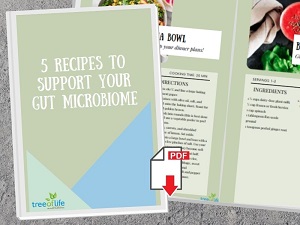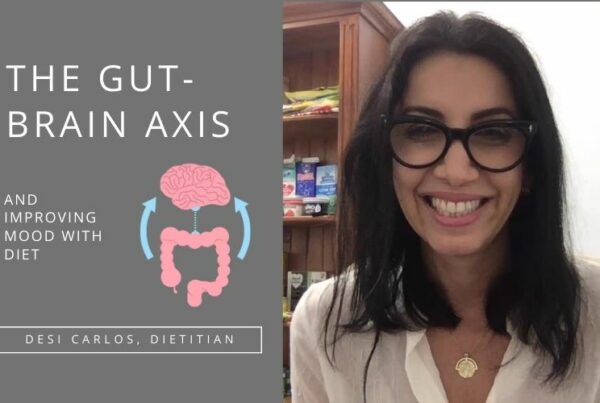
Irritable Bowel Syndrome Causes, Symptoms and Dietary Treatment
Have you been experiencing abdominal pain or discomfort and wonder if you have irritable bowel syndrome? Or maybe you’re one of the 1 in 7 Australians who have been diagnosed with this condition? Maybe you’re losing hope it will ever go away? In this article and video, I explain more about the two main irritable bowel syndrome causes we uncover in our clinic. Poor gut health and food intolerance. I explain how these issues may impact irritable bowel syndrome (IBS). As well as the importance of working with a specialist IBS dietitian to find your answers.
April is Irritable Bowel Syndrome Awareness Month, with this year’s theme, Breaking the Stigmas. We hope that highlighting this condition more widely means more people can understand the typical irritable bowel syndrome causes, and those who suffer with IBS can get the help they need. We know that talking about this stuff isn’t always easy. It can be embarrassing to discuss bowel motions and frequency. It can be daunting to think about giving up your favourite foods. And even more daunting to think you’re going to have to put up with irritable bowel syndrome forever. But there is hope for treating your poor tum!
Symptoms of irritable bowel syndrome
Do you wonder if you have IBS? About 15% of Australians have irritable bowel syndrome and more women than men have the condition. The main symptoms include:
- Abdominal distention (expansion) or bloating (swelling)
- Abdominal cramping, discomfort or pain
- Excessive wind production with either burping, flatulence or both.
- Changes in bowel motion with either loose or hard stools. Or sometimes oscillating between the two.
Secondary symptoms which may accompany these include:
- Acid reflux
- Brain fog
- Anxiety
- Rashes over the body
- Feeling inflamed in arms and hands
- Puffiness or inflammation in the face
- Inability to lose weight
What is so bad about living with IBS?
Firstly, it’s completely uncomfortable. In some cases, it can be very painful. If you have another inflammatory condition, like endometriosis, adenomyosis, inflammatory bowel diseases or coeliac disease, it can also be influenced by IBS. Flare ups can make those conditions feel worse too. So controlling the IBS symptoms may also help to manage your inflammatory condition.
Irritable bowel syndrome causes
Unfortunately, there is no single answer as to what causes irritable bowel syndrome. And so, treatment is also not straightforward. IBS is classed as a long-term condition. However, working with thousands of IBS patients at Tree of Life over the years has meant we’ve seen some common causal factors. Treating these can give you the best shot at reducing symptoms. The first cause we investigate is gut dysbiosis.
What is gut dysbiosis?
Gut dysbiosis is an imbalance of bad bacteria in the gut. Every human has a gut that is composed of both good and bad bacteria as well as yeast. In a healthy gut, the presence of bad bacteria is usually in balance. Our microbiome is developed from the birthing process, from breastfeeding, and when we start eating. We add to the microbiome when we begin playing, and as we age, we pick up further bacteria, both good and bad. This infiltrates our system or gut microbiome. We know that bacteria in our gut plays a crucial role in making us feel very well or very bad. Various negative changes in the gut can tip that balance, and cause dysbiosis.
What causes dysbiosis?
Our microbiome is delicate, and in today’s chemical-laden, high-stress world, it can be easy to upset this balance. Common ways that bad bacteria can take over are:
- Antibiotic overuse, which takes out both good and bad bacteria
- Overuse of medications, including anti-inflammatory agents
- An unhealthy diet, which starves good bacteria of the fuel it needs to flourish
- Excessive alcohol use
- Viral or bacterial infections
- Over-exposure to environmental chemicals
- Ongoing stress and also trauma.

Let’s face it. In this modern world, we are all going to have some issue with gut bacteria at some point in our lives, and hence why we are seeing so many people with gut-related issues today.
Treating IBS by rebalancing the gut microbiome
The first port of call when treating IBS is rebalancing the gut microbiome, the bacteria in our gut. What we want to do is increase the good bacteria, reduce the bad bacteria, and reduce down the yeast production in the gut. At Tree of Life Nutrition, we have a specialised protocol to help with this, which includes some additional, individualised approaches. But generally from a nutritional treatment point of view, we rebalance the gut by starting with a few important changes:
- Increasing good gut bacteria by increasing fibre intake. We want to get over 30 grams of fibre, soluble, insoluble, resistant, starch, FOS GOS, lots of different fibres in lots of different forms. This diversity enhances the production of the good bacteria and fuel them and give them the prebiotics that they need.
- Reducing bad gut bacteria or stopping them from growing in large quantities. This means reducing intake of saturated fats such as animal fats (lean meat not fatty meat) as well as dairy and coconut products. As well as decreasing sugars. By reducing all those things down, we’re actually improving the performance and also the ability to grow the good bacteria in the gut.
Think of the gut microbiome as a living, vibrant thing, a factory if you like. When you’re experiencing dysbiosis, lots of squatters have come in and we’re trying to kick them out. We’re trying to create this new factory, a super duper factory where keen new workers want to come and work.
Can food intolerance cause irritable bowel syndrome?
Irritable bowel syndrome is often put down to food intolerance. You may have heard some people say gluten or dairy is affecting them. Or soy, FODMAPs, or food chemicals. And while yes, food intolerance can contribute to IBS, in our experience, this should never be the first answer.
You’re not going to know if you have a true food intolerance until your dietitian has ruled out dysbiosis, or other gut-related conditions first. If attempts to re-establish a healthy gut microbiome don’t ease IBS symptoms, and there are no other conditions present, then we start to look at food-related intolerances.
Unfortunately, you can’t test for food intolerance. Diagnosis is through a strict elimination and/or low FODMAPs diet. And this process comes with a strong word of caution. Self-diagnosis for food intolerance can be a slippery slope. We often see patients who have been on the rollercoaster of strict diets for months and months on their own, with no success. Many times, experiencing a worsening of symptoms and intolerance over time. This is because diets that remove whole food groups for a long period of time can disrupt the gut microbiome. So PLEASE don’t go straight onto a low-FODMAPs diet without seeing a dietitian, and remember not to stay on any diet longer than four weeks.
It may well be that FODMAPs, salicylates, amines, gluten or dairy are contributing factors in your IBS. With supervision from a dietitian, you will know this for sure. However, sometimes those people who first thought they were intolerant have fixed the gut microbiome, and have been able to freely eat a wider variety of foods than before.
What diet helps to rebalance gut health and reduce symptoms?
A beneficial, scientifically proven diet to follow for better gut health and decreasing the risk of IBS symptoms is the Mediterranean Diet. Mediterranean food is high in fibre, prebiotics and probiotics, low in bad fats, and abundant in nutrient-rich and antioxidant-rich food. We use the Med Diet abundantly in our gut repair protocols and this can be modified to suit different cultures, tastes and also for food intolerance.

Want a sample of recipes that support better gut health?
We have compiled a free recipe booklet with some easy and tasty Mediterranean-inspired recipes which are also great for overall gut health. Why not give them a try? If you want more Mediterranean ideas and recipes, we also have published two books dedicated to Mediterranean cooking, eating and living.
Let’s find the answers for you.
We’d love to work with you to find the cause of your IBS symptoms, and get you on the road to feeling better again!
DISCLAIMER:
The content in this article is not intended as medical advice. It is also of a general nature and is not tailored to your individual circumstances. If you are experiencing significant digestive symptoms, a 1:1 consultation is always the best approach. Please contact our clinic to discuss your unique situation and our tailored and individualised IBS protocol.
Related articles




